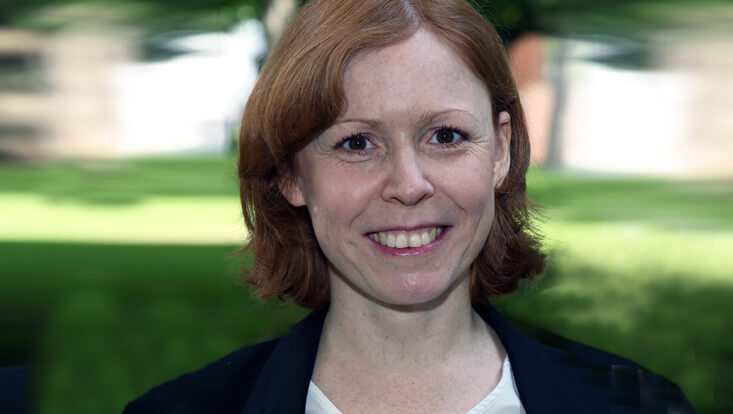“Welcome Aboard!”“I am driven by the vision of a society devoted to longevity and life-long learning.”Prof. Dr. Claudia Kulmus strengthens the Faculty of Education
22 June 2022, by Kulmus / editors

Photo: UHH/Scholz
Every year, Universität Hamburg welcomes numerous new researchers. This series introduces them and their areas of research. This time, we are introducing educational scientist Prof. Dr. Claudia Kulmus.
Prof. Dr. Claudia Kulmus left Humboldt-Universität zu Berlin to join Universität Hamburg. In June, she began her junior professorship for adult education at the Faculty of Education.
My research area in brief:
What primarily drives me is the question as to how we can become a society characterized by longevity and, accordingly, life-long learning. This requires research on learning among older adults and their interests, both in educational institutions and in their everyday and social lives. This is also a political topic—namely the question as to what a society in which we do not assign “old people” a special role might look like. We need infrastructure that also facilitates social participation and recognition later in life.
I am also interested in professional teaching work and in the program planning and organizational design of adult education. For beyond these professional activities, we support adult learning and look for ways to support those who of course learn—for we are all always learning—but who cannot easily figure out how to pursue continuing education.
Concretely, I am currently working on a project on senior citizens in the pandemic in which I look at the long-term, and also positive, consequences the pandemic might have for educational and social institutions—in addition to all the negative aspects that have impacted older people themselves as well as educational and social institutions in the pandemic.
This is how I explain my research to my family:
People learn throughout their entire lives, always anew, always something different. All people can learn until a very advanced age but not everyone has the same conditions and possibilities to do so. Furthermore, there are many prejudices with regard to learning, especially for older people, and we are trying to look at that more closely and when and how people learn “life-long and broadly;” what the necessary conditions are; and also which support, which educational opportunities, and what kind of advice could help.
My research is important for society because:
Among other things, I am driven by the vision of a society devoted to longevity and life-long learning. If we could achieve that, gaps in our (career) biographies would not be so dramatic, and not just for older people but also for younger people because there would always be visible and acceptable ways to re-orient yourself even in old age; to develop further, to try out new areas of activity and enjoy social recognition. And the knowledge, experience, and perhaps even the wisdom of older people should be made more visible both within and outside of conventional employment.
This is why students should come to my lectures:
I see teaching as common work on topics that I approach anew each time together with my students. As an educator for adults, I also try to make my own intentions and thoughts with regard to the seminar or lecture as transparent and comprehensible as possible. This makes cooperation possible and it can also allow for individual interests and development in my seminars. This usually works more or less well—at the least, it is what I hope for.
These are my plans at Universität Hamburg (with regard to knowledge exchange, teaching, etc.):
I would like my projects in participation and career research to contribute to life-long learning through old age and to make an impact in the field of education and, above all, adult education. Learning does not end when employment or family obligations do, and the ability to learn most certainly does not.
As a teacher, I would like to further develop a system of theory-practice-reflection. This is also important to me because at the university, it is mostly about practicing how to think and work academically, and sometimes you can get the impression that this is neither practical nor helpful. I see that completely differently, but the relationship between theory and practice and making their mutual “usefulness” visible requires systematic reflection. We need space for this in teaching.
Reaching out to the world: I work with the following international and federal institutions and universities:
I am just now getting involved in the most various of networks for research on aging—the topic, of course, is also being looked at internationally and from an interdisciplinary perspective. For example, I have made contact, also at conferences, in Finland, England, and Canada. I was in Denmark as part of a teaching exchange and we had a guest researcher from Hungary.
Furthermore, in Hamburg there is the UIL, the UNESCO Institute for Lifelong Learning. That is actually predestined for questions about supporting learning into old age, which I would very much like to get to know and to see if there are possibilities for cooperation.
In Hamburg, the city and the University, I am looking forward to:
The Alster—I have already found my favorite bench for short breaks right near my office—and the traditional “Moin” greeting; my colleagues and the possibilities for developing and shaping academic work.
See the Faculty of Education websitefor an in-depth interview with Prof. Dr. Kulmus.


